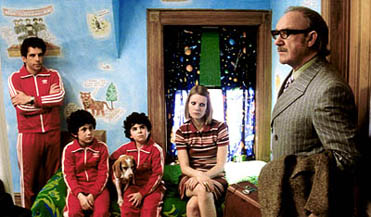Sole Criterion: The Royal Tenenbaums
By Brett Ballard-Beach
January 5, 2012
The written word: The film opens on an image of a book entitled “The Royal Tenenbaums” being checked out from a library, handed across the counter to have its check out card removed, hand stamped (another charming example of the film’s anachronisms and/or favoring antiquity in the face of modernity), and replaced. Throughout the movie (which is broken up into eight chapters and an epilogue), we see the opening pages of the chapters and can glimpse a little of the writing, which appears to be more akin to the stage directions in plays, the field in which Margot Tenenbaum has had past success. Authorial pretensions abound among the characters, not just the aforementioned Cash with his historical revisionism on Custer, but accountant Henry Sherman (a primer on family finances), and neurologist Raleigh St. Clair (who pens a case study of a young man who suffers from “symptoms of amnesia, dyslexia, and color-blindness” tempered with extraordinary hearing). I may be mistaken, but Royal may also have published a book on law, and former financial whiz Chas Tenenbaum one on beating the stock market.
The spoken word: Not everyone has the proper tone and timbre to provide voiceover narration that achieves what the best narration should (in my humble opinion): giving you something you can’t get from the other elements of the film alone. The worst kind of voiceover feels simply thrown in and tacked on, to explain and explain when the realization has hit that the film is a mess (i.e. Southland Tales) and needs a “voice of God” to keep the audience on track. The best combine a wealth of information with a knowing inside tone (Joanne Woodward as an Edith Wharton stand-in for The Age of Innocence), deconstruct expectations through irony and snark (Christina Ricci’s priceless delivery of cynicism laced bon mots for The Opposite of Sex) or simply exist with an omniscient weariness that stands outside of the here and now (Michael Hordern’s cold yet not dispassionate commentary about the life and times of Barry Lyndon).
While The Royal Tenenbaums doesn’t contain one of the best instances ever of voiceover, Alec Baldwin has a voice that blends perfectly with what Wilson and Anderson have penned. The affection that the writers have for the characters extends even to the nameless narrator, and Baldwin does a remarkable job of tempering his seductive voice, which lends itself well to both menace (Glengarry Glen Ross) and ridiculousness (30 Rock). Wry might be the proper word for the tone he strikes (with perhaps a little bemused regret tossed in).
Like an emcee at an awards show, the narrator gets the ball rolling in the first 20 minutes, conveying important information quickly, but also capturing that almost indefinable sense of loss to which I keep alluding. The Narrator’s contributions are limited from then on, but note the exquisite timing and tenor of the line, “Immediately after making this statement, Royal realized that it was true”, which is not only a great Anderson-Wilson one-liner, but a shining example of what Baldwin brings to the film.
Continued:
1
2
3
4
|
|
|
|




